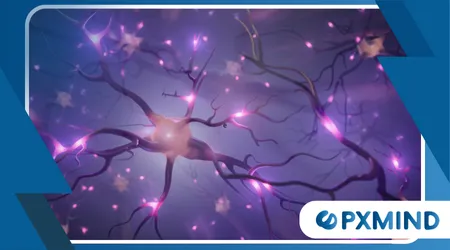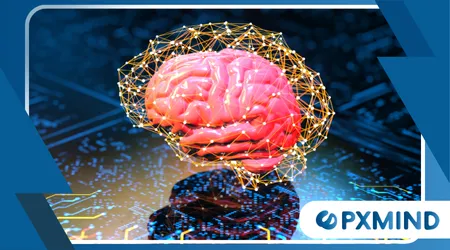Neuroscience Behind Focus: How the Brain Maintains Attention in a Distracting World

Neuroscience Behind Focus. Your brain operates on a fundamental duality of networks. It’s like having two competing teams.
Anúncios
The first is the Task-Positive Network (TPN). This network engages during active, goal-oriented tasks. It’s your brain’s “on-duty” system, handling immediate work.
The second network is the Default Mode Network (DMN). The DMN becomes active when your mind is at rest.
It is responsible for daydreaming, introspection, and mind-wandering.
In a focused state, the TPN and DMN operate in an inverse relationship. When one is highly active, the other is suppressed.
This neurobiological toggle switch determines whether you are engaged in a task or lost in thought. A weak TPN can’t effectively suppress the DMN.
This leads to a mind that constantly jumps from thought to thought.
The Prefrontal Cortex: Your Inner CEO
The prefrontal cortex (PFC) serves as the brain’s executive hub. It’s the region that makes complex decisions and plans. It is essential for sustained attention.
This powerful area acts like a filter. It sifts through the flood of sensory information. It decides what to prioritize and what to ignore. This function is called “attentional control.”
The PFC coordinates multiple cognitive resources. This allows us to maintain focus on a single task. For example, consider a chef in a bustling kitchen.
The chaos of clanging pans and shouting orders is a constant sensory assault. The chef’s PFC filters out this noise.
It allows them to concentrate on the delicate balance of flavors in a simmering sauce. This is a masterful display of executive function.
The Chemistry of Concentration
The ability to focus is heavily dependent on specific neurotransmitters. Think of them as the brain’s own chemical messengers. Dopamine plays a crucial role in reward and motivation.
It helps us initiate and sustain tasks that are not immediately gratifying. Norepinephrine acts like a spotlight. It increases alertness and helps regulate the brain’s arousal states.
It ensures you are awake and ready to act. Acetylcholine is vital for a deeper, more sustained type of focus. It is responsible for maintaining attention over a long period.
Read here: How to Create a Daily Routine That Actually Works
Consider an architect meticulously refining complex blueprints. Their brain is releasing acetylcholine.
This allows them to immerse themselves in the intricate details. They can sustain concentration for hours on end.

Training the Attentional Muscle
Focus is not a fixed trait. It is a skill that can be developed and strengthened. We can actively reshape our neural pathways. This concept is known as neuroplasticity.
A highly influential study by Killingsworth and Gilbert from 2010 found something profound.
People’s minds wandered almost 47% of the time. This was regardless of the task they were performing.
See how interesting: How the New Brain Map Is Transforming Our Understanding of Decision-Making
This statistic underscores our brain’s natural tendency toward distraction. It shows why we must be intentional. Regular practice can rewire the brain for better attention.
Think of your brain like an orchestra. The prefrontal cortex is the conductor. It tells each section when to play. When the conductor is distracted, the music becomes a cacophony.
Mindfulness meditation, for example, strengthens the brain’s attentional control.
This practice can improve your ability to ignore distractions. It also boosts the activity of your TPN.
You become better at directing your inner orchestra. This leads to a more harmonious and productive mental state. It truly is a case of use it or lose it.
| Brain Region | Function in Focus | Function in Distraction |
| Prefrontal Cortex (PFC) | Filters irrelevant information and coordinates attention. | Decreased activity, leading to poor decision-making and wandering. |
| Anterior Cingulate Cortex | Detects and resolves conflicts, helping to sustain effort. | Overwhelmed by competing stimuli, leading to fatigue. |
| Default Mode Network | Suppressed to allow for task-specific engagement. | Dominant, resulting in mind-wandering and a lack of concentration. |
Why, then, do we so often neglect this most vital of mental faculties? It is a question worth considering. Understanding the Neuroscience Behind Focus can empower us to take control.
The Path to Focused Living
Reclaiming your focus in a hyper-connected world is paramount. It’s not about fighting your brain. It is about working with its natural mechanisms.
This requires conscious effort. It means creating environments that support your goals. It also involves training your mind to be present. The science is clear on this matter.
++ 7 Mindful Practices to Start Your Day Right
The Neuroscience Behind Focus offers a roadmap. It shows us how our brain’s attentional systems work. We are not merely passive recipients of distraction.
We possess the agency to shape our own cognitive landscapes. The key is in understanding and applying this knowledge. True productivity is not about working harder.
It’s about working smarter. It’s about leveraging the brain’s power. This is the new frontier of personal development. Mastering your attention is the ultimate skill.
This mastery leads to a deeper engagement with life itself. It enhances memory and creativity. The rewards extend far beyond the task at hand. This is the power of understanding the Neuroscience Behind Focus.
The journey inward is the most rewarding. It gives us the tools to navigate a chaotic external world.

Frequently Asked Questions
1. How does stress affect focus?
Chronic stress floods the brain with cortisol, which can impair prefrontal cortex function. This makes it more difficult to filter distractions and maintain working memory.
2. Can diet influence my ability to focus?
Yes, a balanced diet rich in omega-3 fatty acids, antioxidants, and B vitamins is crucial for brain health. Sugar spikes and crashes can also impair concentration.
3. What role does sleep play in attention?
Sleep is non-negotiable for attention. During sleep, the brain consolidates memories and clears out waste products.
Without adequate sleep, cognitive functions, including focus, are severely compromised.
4. Is multitasking a myth?
Neuroscience indicates that true multitasking is a myth.
The brain rapidly switches between tasks, a process that is inefficient and leads to a decline in performance and increased mental fatigue.
